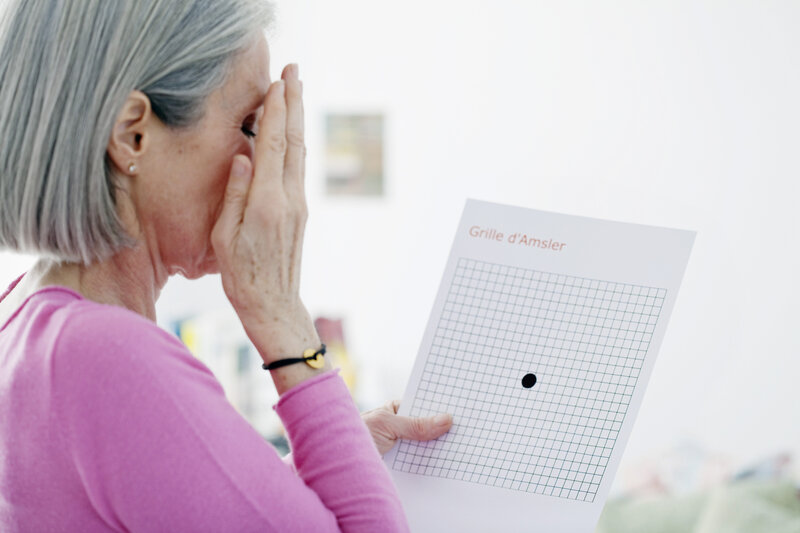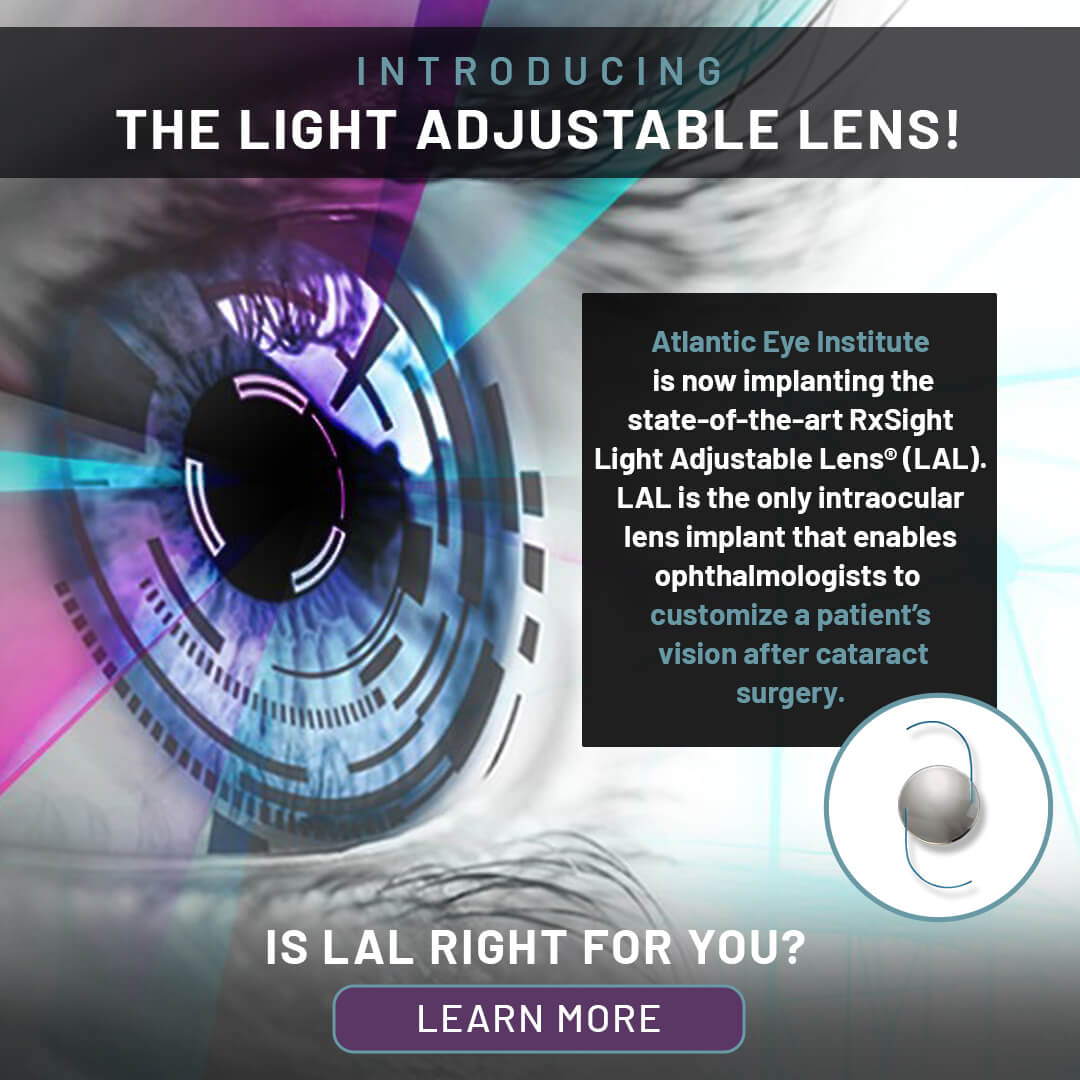Macular degeneration is the leading cause of vision loss for adults 50-years and older in the United States, and that includes cataracts and glaucoma cases combined. It is an age-related cause of vision loss. And, while we can’t stop you from aging, there are things you can do to minimize your chances of developing macular degeneration and to slow down its progression.
Age-Related Macular Degeneration: Definition, Symptoms, & Risk Factors
Age-Related macular degeneration (AMD) takes place in the macula area of the retina. It creates vision loss at the center of your gaze. So, while details will get fuzzy or disappear in the middle of your vision, you’ll still have vision on the sides (peripheral).
For example, if you are looking at a clock with macular degeneration, you can probably see the numbers or at least some of the numbers around the clock’s perimeter but you won’t be able to see the middle or the dial very well.
Sometimes the condition develops very slowly, and vision loss is hardly noticeable from year to year until it finally diminishes to the point of causing you problems or being detected during an eye exam. For others, AMD progresses more rapidly, which can cause a faster onset of vision loss. It can happen in one eye or both eyes.
There Are Two Types Of Macular Degeneration:
Dry macular degeneration
This is the most common type of AMD. Dry macular degeneration accounts for about 80% of all AMD in the United States. For people with dry AMD, the retina begins to shrink as they get older, and this causes excess proteins to form. The proteins are called drusen, and their growth blocks vision.
Treatment for dry macular degeneration
Currently, there is no treatment for dry AMD. This can be frustrating for anyone who gets a diagnosis. Instead, we’ll do all we can to support and protect the vision you have. Lifestyle changes can also slow down its progression, including eating well, regular exercise, and quitting smoking.
According to the American Academy of Ophthalmology (AAO), studies have shown that a healthy diet, supplemented with the following vitamins/minerals can slow down AMD’s progression:
- Vitamin C (500 mg)
- Vitamin E (400 IU)
- Lutein (10 mg)
- Zeaxanthin (2 mg)
- Zinc (80 mg)
- Copper (2 mg)
Always speak to your primary physician and your ophthalmologist before adding any supplements to your diet or making any dramatic changes to your diet or lifestyle.
Wet macular degeneration
Wet (neovascular) macular degeneration is less common but is more serious than its dry counterpart. In the beginning stages of wet AMD, blood vessels begin to grow underneath the retina. This is no normal so, over time, the vessels can leak blood or create scar tissue, and that compromises the retina.
As a result, vision loss is typically much faster for people with wet macular degeneration, and they may not notice they have it until vision loss has already progressed to a notable degree.
Treatment for wet macular degeneration
If you are diagnosed with wet macular degeneration, we’ll use medications called Anti-VEGF drugs to treat the condition. The medication is administered via injections, directly into the eye. They not only slow down the development of the abnormal blood vessels but the anti-VEGF drugs can also slow down any bleeding or leaking from existing vessels.
Typically the injections are administered by your ophthalmologist about once every month, to begin with. Over time, your schedule may change to once every other month or so. There is also a type of laser treatment, called photodynamic therapy (PDT) used to treat wet macular degeneration. It uses the combination of a special medication and light therapy to “clot” the vessels, which blocks them and prevents them from leaking.
AMD Risk Factors And Prevention
There are some risk factors associated with developing macular degeneration, especially the wet version:
- Age (macular degeneration usually shows up in adults in their 50s or 60s)
- A family history of AMD
- Diets that are higher in saturated fats (red meat, butter, cheese, etc.)
- Being overweight
- Smoking (which also elevates your risk for developing cataracts)
- Having high blood pressure
- Heart disease
- Being caucasian
As you can tell from the “risk list,” your lifestyle plays a large role in your chances of developing vision loss from AMD and other eye conditions. You can lower this risk by:
- Speaking to your ophthalmologist and physician about adding the right supplements to your diet
- Adding leafy greens to your diet (kale, spinach, chard, bok choy, cabbage, etc.)
- Eating orange and yellow fruits and veggies
- Swapping a healthy fish for red meat whenever possible
- Managing your weight
- Managing existing heart disease
- Getting at least 30 minutes of exercise, at least five days per week
The better care you take of your body, the longer you may have before developing AMD and the slower it may progress.
Tips For Optimizing Vision After AMD
It’s true that we can’t reverse AMD and that there is no way to treat it 100%. However, in addition to keeping you up-to-date on your lens prescriptions, there are other things you can do to improve vision after being diagnosed with age-related macular degeneration.
Your ophthalmologist will help you learn more about vision-enhancing tips, tricks, and technology such as:
- Enlarging the font on your computer, smartphones, and other gadgets for better visibility
- Remembering to purchase or order library books in their large-print form
- Keeping high-quality magnifying glasses on-hand where you are most likely to need them (end tables, coffee tables, office drawers, etc.)
- Electronic magnifying devices that help you sit and read magazines, newspapers, letters, paper bills, etc.
We will also keep you up to date on the latest research, theories, and treatments available to support vision health after an AMD diagnosis.
Are you overdue for your next eye checkup and vision tests? Don’t miss out on the opportunity to catch macular degeneration and other age-related causes of vision loss before they progress too far. Schedule an appointment with the macular degeneration experts at the Atlantic Eye Institute.

